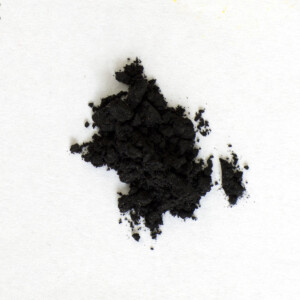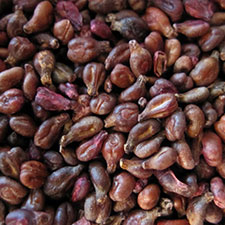Grape Seed Black
Natural organic pigmentComposition and Properties of Grape Seed Black
Grape seed black is finely ground material obtained by carbonizing (charring) grape seeds. The pigment is very stable and lightfast as are all carbon blacks. and there are no known incompatibilities with other pigments.

Pigment

Painted swatch
Names
Color Index
PBk 8, CI 77268
Word origin
Probably a back-formation from graper “steal; grasp; catch with a hook; pick (grapes),” from a Frankish or other Germanic word, from Proto-Germanic *krappon “hook,”
From Online Etymology Dictionary
Traubenkernschwarz
German
Noir de raisin
French
Nero di noccioli di uve
Italian
Negro de uva
Spanish
Preparation
Grape seed black is finely ground material obtained by carbonizing (charring) grape seeds.

Grape seeds
History of Use
Pliny mentions in his writings that the black pigment of antiquity was prepared by charring of grape seeds. Later they made charcoal from wood or used coal or soot directly as a pigment (1).
References
(1) Doerner, M. The Materials of the Artist and Their Use in Painting: With Notes on the Techniques of the Old Masters, Revised Edition, Mariner Books, 1949.
Identification
Raman Spectrum
(1) Eugenia P. Tomasini, Emilia B. Halac, María Reinoso, Emiliano J. Di Liscia and Marta S. Maier, Micro-Raman spectroscopy of carbon-based black pigments, Journal of Raman Spectroscopy, Special Issue: Raman spectroscopy in art and archaeology, Volume 43, Issue 11, pp. 1671–1675, November 2012.
(2) Alessia Coccato, Jan Jehlicka, Luc Moens and Peter Vandenabeele, Raman spectroscopy for the investigation of carbon-based black pigments, Journal of Raman Spectroscopy, Special Issue: 11th International GeoRaman Conference, Volume 46, Issue 10, pages 1003–1015, October 2015. DOI: 10.1002/jrs.4715. Available as pdf.
Further Reading
References
Winter, J. and West FitzHugh, E., Pigments based on Carbon, in Berrie, B.H. Editor, Artists’ Pigments, A Handbook of Their History and Characteristics, Volume 4, pp. 1-37.
J. Winter, “The Characterization of Pigments Based on Carbon” Studies in Conservation, 28:49-66, 1983.
S. Muntwyler, J. Lipscher, HP. Schneider, Das Farbenbuch, 2nd. Ed., 2023, alataverlag Elsau, pp. 160-65.
